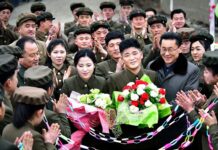[imText1]New York — “Fitfully, but progressively, some of the tenor, tone, and directions of Chinese policy have been redefined. China’s historic interest in its relationship with (North Korea) has diminished significantly,” says Dr. Jonathan Pollack, a professor of Asian and Pacific Studies and Chairman of the Asia-Pacific Studies Group at the Naval War College in Newport, Rhode Island.
In a new lecture, part of a series hosted by Columbia University in New York, Dr. Pollack endeavored to explain the changing strategies and attitudes of different groups within China toward North Korea, pointing out that China as a whole is clearly no longer an unquestioning supporter of its neighbor, something that overseas watchers have a tendency to assume.
“There is a desire to get ideas out in the open in a more significant way,” he explained, “and at the same time, there has been private but explicit venting, even from some senior leaders.”
“The fates of these two systems have been very much intertwined, and their relationship is one of intermingling and interdependence,” he went on, “but as China has become more and more invested in an external relationship, economically, politically, and otherwise with the United States and others, the strains… have become increasingly manifest.”
Those criticisms of North Korea coming out of China are not only displays of frustration, Pollack notes, there is also new and important “open criticism of foreign policy decision making.”
In trying to explain from where within the Chinese political spectrum these criticisms emanate, Pollack introduced three schools of domestic Chinese thinking on North Korea. The first school of thought, the so called “hard-line” school, in essence sees North Korea’s continuing pursuit of nuclear capabilities as the principle problem, in that it leads the United States to reinforce some of its strategies in Northeast Asia that are directly harmful to China’s own interests.
The second, “stability-first” constituency sees larger dangers and risks not directly in the tests themselves but more from whether such tests trigger other consequences, such as the collapse of the North Korean state, since this school of thought still believes that North Korea should serve as an important buffer zone, inhibiting any possible hostile presence near China’s borders.
Meanwhile, the third school pays almost no attention to nuclear weapons at all, but prefers to focus on developing trade and business contacts with the North.
Pollack believes that China’s debate over North Korea entails much more than its pursuit of nuclear weapons. “The debate is real, even as the fundamentals of Chinese policy at present largely persist,” he explained, “[After the 2006 nuclear test, the Chinese were] openly thinking about how North Korea, as a state intent on goals that were diverging from many of those that China followed, was potentially causing China grief over time.”
So how long will the present policy be maintained? Pollack concedes that, for the time being, China wants North Korea to remain an independent state, and that while some argue this reflects China’s supposed aversion to any prospect of Korean unification, and others assert it is a continued wariness about American strategic intentions and simple anxiety over potential internal upheaval that is driving the policy forward, either way, “There is, I think, a continued belief… that over time a presumptive soft landing with North Korea might still be possible and conducive to China’s interests,” he concluded.
Pollack’s lecture, “China’s Strategic Debate over North Korea: How Real? How Far? To What End?” was part of a series, “North Korea and a Changing Northeast Asia” hosted by the Weatherhead East Asian Institute at Columbia University in New York, NY.

















